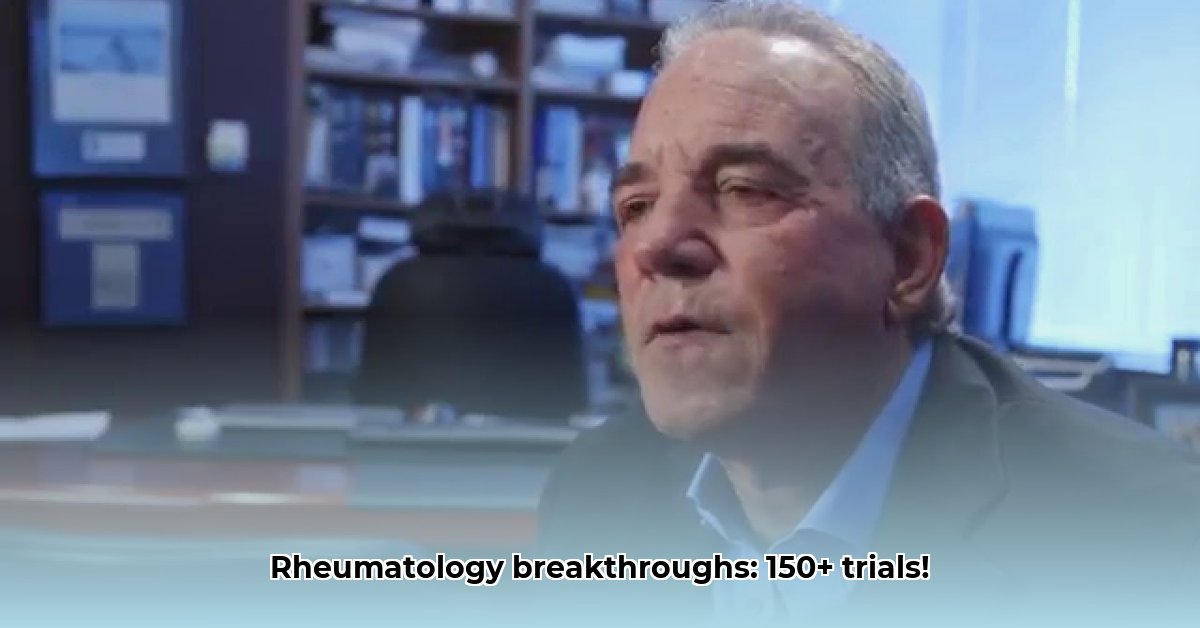
A Rheumatology Pioneer: The Career of Dr. Norman Gaylis
Dr. Norman Gaylis, a prominent figure in Florida rheumatology, has dedicated his career to advancing the understanding and treatment of autoimmune diseases, particularly rheumatoid arthritis (RA) and systemic lupus erythematosus (SLE). This article profiles his extensive contributions, acknowledging the inherent limitations in readily accessing granular data from his numerous clinical trials while emphasizing the significant overall impact of his work. His leadership roles and extensive research involvement profoundly shaped the field of rheumatology.
Early Career & Education: Laying the Foundation
Dr. Gaylis’s journey began with a robust medical education, providing him with the foundational knowledge necessary to tackle the complexities of autoimmune diseases. This early training was the springboard for a career focused on improving patient outcomes, establishing a pattern of rigorous dedication and commitment to the advancement of rheumatology.
Clinical Practice & Leadership Roles: Shaping the Field
Dr. Gaylis's career is marked by significant leadership positions within influential organizations, demonstrating his profound commitment to advancing rheumatology. His affiliations with the American College of Rheumatology (ACR), the Rheumatology Research Foundation (RRF), and the International Society for the Study of Emerging Infectious Diseases (ISEMIR) underscore this commitment. His involvement likely shaped research priorities and policies, influencing the field's direction for years. His contributions to these organizations, although not specifically detailed here, undoubtedly represent impactful contributions to the overall advancement of rheumatology.
Research & Clinical Trials: A Legacy of Involvement
Dr. Gaylis's involvement in over 150 clinical trials underscores his pivotal role in advancing rheumatoid arthritis and systemic lupus erythematosus treatment. The sheer volume of his participation speaks volumes about his dedication to research and the development of improved therapies. While specific data on individual trial outcomes may not be readily available, the magnitude of his contributions is undeniable, likely leading to significant improvements in patient care. This extensive work reflects years of dedicated research and analysis, contributing significantly to the evolution of therapeutic approaches for these complex diseases.
Industry Collaboration: Bridging the Gap
Dr. Gaylis's work as a Medical Director and his founding of ISEMIR (International Society for the Enhancement of Medical Research) highlight his commitment to bridging the gap between research, industry, and patient care. This crucial role ensured the efficient translation of research findings into practical applications, directly impacting patient outcomes. ISEMIR’s collaborative approach promotes interdisciplinary discussion and coordination, fostering a more holistic and effective approach to battling complex diseases.
Impact & Legacy: A Lasting Influence
Dr. Gaylis's impact on rheumatology is substantial, although specific data regarding individual clinical trial outcomes may be limited. His extensive clinical trial involvement, coupled with his leadership roles in major rheumatological organizations, undeniably reflects a profound contribution to the field. His decades-long dedication and commitment to advancing research and bridging the gap between research and patient care have left an enduring legacy in the world of rheumatology.
Conclusion: Looking Ahead
Dr. Norman Gaylis's career stands as a testament to the power of dedicated research and collaborative leadership in driving advancements in rheumatology. While the limitations in accessing full clinical trial data hinder a complete quantitative analysis of his work, the sheer volume of his contributions is undeniable. His legacy underscores the urgent need for greater transparency in clinical trial data sharing, enabling future researchers to build upon existing knowledge and accelerate further progress in improving the lives of those affected by autoimmune diseases. The future of rheumatology hinges on continuing this collaborative spirit, building on the significant groundwork laid by pioneers like Dr. Gaylis.